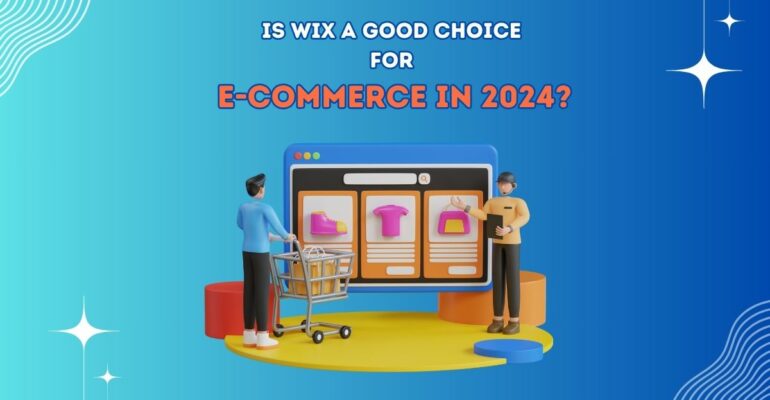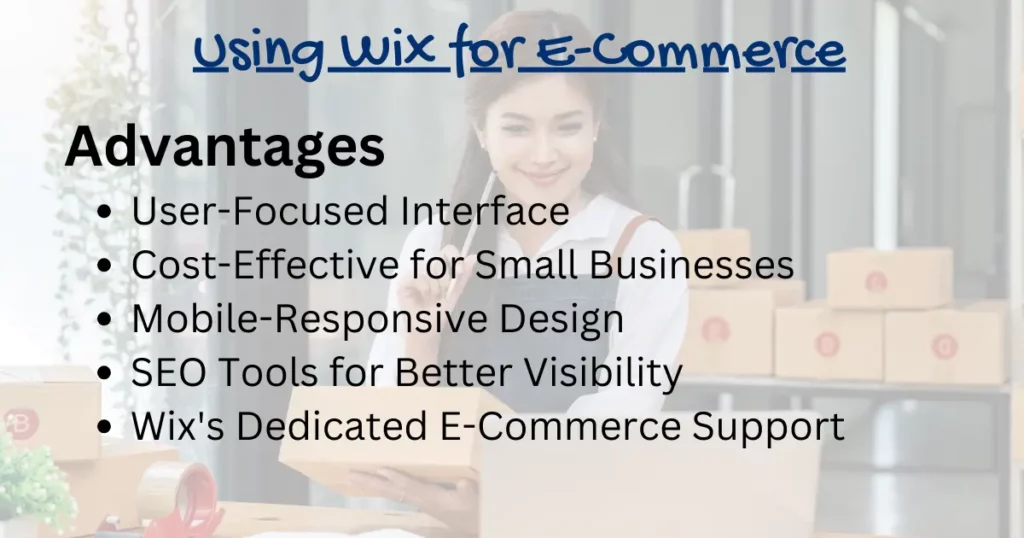Is Wix a Good Choice for E-Commerce in 2025?

Is Wix a Good Choice for E-Commerce in 2025?
Table of Contents
In today’s rapidly evolving digital landscape, e-commerce has become a cornerstone for businesses looking to expand their reach and increase revenue. With Global e-commerce sales reaching approximately $5.8 trillion in 2023 and expected to surpass $8 trillion by 2025, selecting the right platform is more critical than ever for businesses aiming to compete in this dynamic market. The rise of mobile commerce, social shopping, and personalized customer experiences are just a few trends driving the e-commerce industry forward. As businesses of all sizes look to capitalize on these trends, having the right tools and technology becomes essential to stand out in a saturated marketplace.
One platform that has gained significant attention in recent years is Wix. Known initially as a simple website builder, Wix has expanded its offerings to include robust e-commerce capabilities. However, with competitors like Shopify, WooCommerce, and BigCommerce dominating the market, is Wix truly the right choice for your e-commerce business in 2024? In this post, we’ll explore the pros and cons of using Wix for e-commerce, delve into the latest industry trends, and assess whether it aligns with the needs of businesses striving to succeed in a fiercely competitive online environment.
Is Wix Good for E-Commerce?
Wix has gained popularity due to its user-friendly interface and the ability to build aesthetically pleasing websites without needing technical skills. When it comes to e-commerce, Wix provides a variety of tools and features tailored to online stores, making it a strong candidate for entrepreneurs.
Key Features of Wix for E-Commerce
Easy-to-Use Drag-and-Drop Editor: Wix allows users to design custom storefronts effortlessly with its drag-and-drop builder, eliminating the need for coding skills. This flexibility appeals to small businesses and beginners seeking an online presence.
Wide Range of Templates: Wix offers numerous professionally designed e-commerce templates that cater to various industries. Whether you’re in fashion, electronics, or health, Wix has something to match your niche.
App Market for Additional Functionality: Wix’s app market provides numerous integrations and add-ons to enhance your store’s capabilities, from marketing tools to inventory management, increasing the potential for scalability.
Wix Payments: Integrated payment processing solutions, including Wix Payments, PayPal, and Stripe, offer businesses flexibility in accepting payments globally.
Also read: 14 Steps How to Dropship Using Wix?
The Advantages of Using Wix for E-Commerce

1. User-Focused Interface
Wix is renowned for its ease of use. For business owners with little to no web development experience, this makes it an attractive option. With no complex coding or technical setup involved, Wix helps you launch your e-commerce store quickly.
To create a user-focused website for your business, complete with a customized theme, sales tracking, and a custom admin panel, hiring a professional web development agency is essential.
2. Cost-Effective for Small Businesses
Wix offers a variety of pricing tiers, including a competitive e-commerce plan that is affordable for startups and small businesses. Compared to custom development solutions, Wix’s platform presents a budget-friendly solution for entrepreneurs looking to scale without the high overhead costs.
3. Mobile-Responsive Design
With a growing number of users shopping via mobile, your store must look and perform well on all devices. Statista reports that mobile commerce (m-commerce) sales in the U.S. alone are expected to reach $710 billion by 2025, highlighting the need for mobile-responsive websites. Wix’s templates are mobile-responsive, ensuring that your customers have a seamless shopping experience, regardless of the device they use.
4. SEO Tools for Better Visibility
Although Wix had previously received criticism for its SEO capabilities, the platform has made significant improvements. Wix now includes built-in SEO tools, including SEO Wiz, URL customization, meta tags, and alt text options, allowing users to optimize their stores for search engines. This can significantly improve visibility, helping your store rank better on Google. If you’re thinking about growing your small business with SEO and boosting sales, there’s no need to worry. Just hire a reputable SEO agency, and your sales will grow organically.
Moreover, BrightEdge research shows that 53.3% of all website traffic comes from organic search, further emphasizing the importance of good SEO in driving traffic to e-commerce stores.
5. Wix’s Dedicated E-Commerce Support
Wix provides dedicated customer support for e-commerce users, including live chat, phone support, and a rich knowledge base. This is crucial when you face technical issues or need guidance on optimizing your store for better performance.
Disadvantages of Using Wix for E-Commerce

While Wix has several strengths, there are limitations to consider when using it for e-commerce.
1. Limited Scalability for Large Stores
Wix is best suited for small to medium-sized businesses. For large e-commerce operations with thousands of products, Wix may struggle to provide the necessary tools for scalability. The platform’s structure can become cumbersome as your store grows, potentially leading to performance slowdowns. Shopify’s annual report shows that their platform powers more than 4 million businesses globally, offering tools that scale better with larger inventories and more complex needs.
2. Limited Customization for Advanced Users
While the drag-and-drop builder is great for beginners, experienced developers may find it limiting. Advanced customization options, such as access to the site’s code, are restricted, which can limit the design and functionality flexibility for growing businesses.
3. Transaction Fees
Wix applies transaction fees when you use third-party payment gateways like PayPal or Stripe. This can cut into profit margins, particularly for businesses that process a high volume of transactions. According to Oberlo’s 2023 report, 79% of U.S. shoppers make purchases online. As your store grows and handles more transactions, these fees can add up quickly.
E-Commerce Trends in 2024 Shaping Platform Choices
Several key trends are expected to shape the e-commerce landscape in 2024, impacting which platforms will thrive:
- AI and Personalization: AI-powered personalization tools are becoming crucial for online shopping experiences. McKinsey reports that companies using advanced personalization generate 40% more revenue. While Wix’s platform includes basic personalization tools, other platforms, like Shopify and BigCommerce, offer more sophisticated AI-driven solutions for larger enterprises.
- Growth of Social Commerce: Social media platforms like Instagram, Facebook, and TikTok are integrating e-commerce features more heavily, allowing consumers to make purchases directly from their social media feeds. A 2023 report from eMarketer projects that social commerce will generate $79.64 billion in U.S. sales by 2025. Wix’s ability to integrate with social platforms can help small businesses tap into this growing trend.
- Sustainability and Ethical Shopping: Consumers are increasingly drawn to brands that emphasize sustainability. E-commerce platforms that make it easy to showcase sustainable products and practices are likely to see growth. Wix allows businesses to create dedicated pages that highlight their sustainability efforts, appealing to this growing market.
Wix vs. Other E-Commerce Platforms
When comparing Wix with other e-commerce platforms such as Shopify, WooCommerce, and BigCommerce, several differences stand out. While Shopify is built specifically for e-commerce, Wix offers more general web-building tools. Here’s a quick comparison:
| Platform | Ease of Use | Scalability | Customization | Payment Options |
| Wix | Easy | Moderate | Limited | Multiple, with fees |
| Shopify | Moderate | High | Extensive | Multiple, no additional fees |
| WooCommerce | Moderate | High | High | Multiple, no additional fees |
| BigCommerce | Moderate | High | Moderate | Multiple, no additional fees |
Read more about Shopify: Is Shopify Good for Small Businesses in 2024?
Is Wix the Right E-Commerce Platform for You?
The suitability of Wix as an e-commerce platform depends on the size and goals of your business. For small to medium-sized enterprises, Wix provides an affordable, easy-to-use solution with all the essential tools to run an online store. Its drag-and-drop interface, variety of templates, and integrated marketing features make it ideal for beginners and small business owners.
However, if you’re planning to scale quickly or manage a larger operation with complex needs, you may encounter limitations in terms of customization, scalability, and advanced e-commerce functionality. In such cases, platforms like Shopify or WooCommerce may offer more flexibility and power.
Final Thoughts
In 2024, Wix remains a viable e-commerce solution for small businesses and entrepreneurs who need a simple, efficient, and visually appealing platform to launch their online stores. While it may not be the best fit for larger enterprises or users seeking advanced customization, Wix excels in its ease of use, affordability, and built-in features that cater to e-commerce beginners.
Ultimately, choosing the right platform comes down to understanding your business’s current needs and long-term growth potential. If simplicity and ease of setup are your top priorities, Wix can serve as an excellent launching pad for your e-commerce journey.





